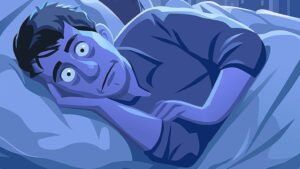Overview
Anxiety and insomnia frequently coexist, creating a vicious cycle that can seriously harm a person’s health. Anxiety disorders are frequently accompanied by sleep difficulties, and inadequate sleep can intensify anxiety, leading to a difficult-to-break cycle. Effective treatment and management of insomnia and anxiety require an understanding of their complex interaction. In this piece, we examine the mechanics underlying this relationship and consider methods for ending the pattern.
The Relationship Between Anxiety and Insomnia
Anxiety is frequently present in cases of insomnia, which is characterized by trouble getting asleep, remaining asleep, or waking up too early. On the other hand, those who suffer from anxiety disorders usually have trouble falling or staying asleep, are restless when they sleep, or wake up early. This reciprocal association points to a nuanced interaction between anxiety and sleeplessness.
Mechanisms of Neurobiology
A major contributing reason to the association between anxiety and sleeplessness is neurobiological. Both disorders may be exacerbated by the dysregulation of neurotransmitters such norepinephrine, gamma-aminobutyric acid (GABA), and serotonin. For instance, anxiety disorders and also insomnia are linked to low levels of serotonin, a neurotransmitter involved in mood regulation and sleep-wake cycles. Similarly, elevated anxiety and disturbed sleep can result from abnormalities in GABA, the brain’s principal inhibitory neurotransmitter.
Furthermore, anxiety and sleeplessness are linked to changes in the body’s main stress response system, the hypothalamic-pituitary-adrenal (HPA) axis. Prolonged stress can cause the HPA axis to become dysregulated, which raises cortisol levels—the stress hormone—and impairs sleep quality while exacerbating symptoms of anxiety.
Mental Elements
Anxiety and sleeplessness are linked in part by cognitive variables. Anxious people frequently have racing thoughts, worry, and rumination, all of which can hinder the start and maintenance of sleep. Anxiety can be exacerbated by worrying about the worst-case scenario, which can lead to a vicious cycle of fear and insomnia.
Control of Emotions
Having good emotional control is crucial for controlling anxiety and insomnia. Lack of sleep impairs the brain’s capacity to control emotions, leaving people more prone to increased stress and worry. On the other hand, anxiety can make it difficult to use cognitive and relaxation skills that encourage sleep, which feeds the vicious cycle of concern and insomnia.
Patterns of Behavior
Anxiety and sleeplessness are also maintained by maladaptive behavioral patterns. People might develop bad sleep habits that interfere with their natural sleep-wake cycle, like taking too many naps, drinking coffee, or using electronics right before bed. Similarly, anxiety-driven avoidance behaviors, including staying up late to prevent worry at night or doing exciting things to divert attention from worried thoughts, can exacerbate sleep issues.
Ending the Cycle
It takes a comprehensive strategy that addresses the underlying causes as well as the symptoms of each illness to break the cycle of anxiety and insomnia. Here are some tactics to think about:
Cognitive-Behavioral Therapy (CBT):
Treat for insomnia (CBT-I) is a very successful treatment that focuses on unhelpful beliefs and actions that cause sleep problems. Through the use of behavioral techniques including stimulus control and sleep restriction, together with the correction of cognitive distortions, CBT-I assists people in creating more restful sleep patterns and lowering anxiety-related arousal before bed.
Mindfulness-Based Interventions:
People can learn to cultivate present-moment awareness and control their emotional reactions to stress and anxiety by practicing mindfulness meditation and other relaxation techniques. By encouraging acceptance and relaxation, mindfulness exercises help people deal with the physiological arousal and intrusive thoughts that disrupt their sleep.
Stress management:
People can lower their general anxiety levels and encourage relaxation before bedtime by learning useful stress management strategies like progressive muscle relaxation, deep breathing exercises, or guided imagery. Additionally essential to stress reduction and good sleep hygiene are regular exercise, a healthy diet, and a regular sleep schedule.
Treating Underlying Anxiety Disorders:
Consulting a therapist or psychiatrist is essential if anxiety symptoms have a substantial negative influence on the quality of your sleep. Anxiety symptoms can be reduced and sleep quality can be enhanced by evidence-based therapies for anxiety disorders, such as cognitive-behavioral therapy (CBT), medication, or a combination of both.
Establishing a Calm Nighttime Routine and Optimizing the Sleep Environment:
These two strategies can improve the quality of your sleep. This entails minimizing exposure to blue light-emitting displays, which can interfere with melatonin production and disturb circadian rhythms, keeping the bedroom cold, dark, and quiet before bed, and avoiding stimulating activities right before bed.
In summary
An individual’s quality of life can be greatly affected by the intricate interplay between worry and insomnia. It is feasible to end the cycle of anxiety and insomnia by comprehending the fundamental causes and putting focused treatments into place. People can regain peaceful sleep and lessen worry by combining cognitive-behavioral techniques, stress management methods, and lifestyle adjustments. This will increase their general well-being and ability to bounce back from setbacks.
